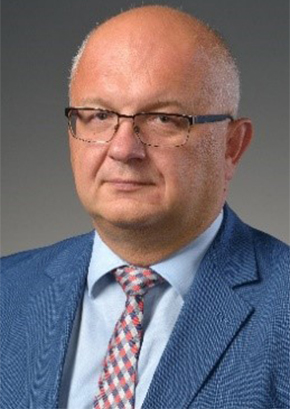THE THIRD INTERNATIONAL SYMPOSIUM
ON THERMAL-FLUID DYNAMICS 2022
(ISTFD 2022 )

THE THIRD INTERNATIONAL SYMPOSIUM
ON THERMAL-FLUID DYNAMICS 2022
(ISTFD 2022 )

Dariusz Mikielewicz
Gdansk University of Technology, Faculty of Mechanical Engineering and Ship Technology, Institute of Energy
ul. Narutowicza 11/12, Gdansk, 80-233, Poland
E-mail dariusz.mikielewicz@pg.edu.pl
Dariusz Mikielewicz is a professor in the Department of Thermal Engineering at the Faculty of Mechanical Engineering of Gdańsk University of Technology. In years 1999-2002 he was invited to the position Vice-Dean for Basic Education at the faculty followed by the position of Vice-Dean for Education in years 2002-2005. On November 15, 2002, he presented the Council of the Faculty of Mechanical Engineering the thesis with his habilitation dissertation titled "Modelling of momentum and heat transfer in two-phase boundary layer". Habilitation thesis, along with related publications have been distincted with the President of the Polish Academy of Sciences Award in the name of Bogdan Stefanowski in 2003. In 2010 he received the title of professor from the President of Poland.
In 2004-2008 he was an elected member of the Science Council at the Ministry for Science and Education for technical sciences. Since 2007 is an elected member of the Committee of Thermodynamics and Combustion PAS, and since 2015 member of the Presidium of that Committee. From 2015 he is a member of the Committee for Basic Problems of Energy at the Polish Academy of Sciences. In 2018 he was awarded Siemens Awards for distinctive results of scientific research capable of implementation in practice. From 1st January 2022 he is elected to be a corresponding member of Polish Academy of Sciences. From 1 September 2016 he was acting as the Dean of the Faculty of Mechanical Engineering and from 1st October 2019 as a vice-rector for organisation and development of Gdansk University of Technology till present. As a proxy dean he strongly contributed to the merger between the Faculty of Mechanical Engineering and Faculty of Ocean Engineering and Ship Technology to form a new Faculty of Mechanical Engineering and Ship Technology from 1st January 2021.
Title: Flow boiling and flow condensation at low, medium and high reduced pressures
Abstract:Flow boiling and condensation phenomena in mini- and microscale channels are essentially processes involved in a wide range of industrial applications such as heat exchangers, high heat flux cooling and the like in mechanical, chemical, aerospace, energy, automotive and renewable energy, electronics and also biological and medical engineering. The above shows how exact prediction two-phase heat transfer coefficient is necessary. Recently there is observed an increased interest in development of new heat transfer installations where either flow boiling or flow condensation is employed under conditions close to the thermodynamic critical point. For example mentioned here can be the organic Rankine cycle (ORC) installations as well as high temperature heat pumps (HTHP) which are very attractive options for example in recovery of heat from industrial processes or waste heat. In these applications either new fluids are implemented or the known ones are used under conditions reaching the thermodynamic critical point. Prediction of pressure drop and heat transfer under such conditions can usually be made using empirical methods using models developed for specific fluids. Such methods suffer from not being general and cannot be applicable to a variety of fluids. Most of the experimental evidence of pressure drop and heat transfer characteristics come from the refrigeration applications. Literature review shows a gap in knowledge on flow boiling of low boiling point liquids at high saturation temperatures (above 120°C) for medium/high values of reduced pressure (0.5-0.9). Experimental data can be found in literature for similar values of reduced pressure but for the lower values of the saturation temperature. Most of the data presented in the literature relate to saturation temperatures in the range -20°C to 40°C due to the application of such fluids in refrigeration technology. With the increase in saturation temperature to and above critical values, reduced pressure increases, the density and viscosity of the vapor phase rises, while the opposite trend is noticed for the liquid phase. These influences directly contribute to velocity increase of liquid phase and reduction of the vapor phase, what results in similar values of the phase velocities. The increase in the reduced temperature also leads to reduction in surface tension, what renders gravitational forces to become dominant. Prediction of pressure drop and heat transfer under such conditions is very challenging. Existing two-phase pressure and heat transfer models rarely include the reduced pressure effect on their performance. Thermal-hydraulic mechanisms associated with strong changes in physical properties of working fluids near the critical point are responsible.
In the lecture attention will be focused on the influence of reduced pressure on the predictions of heat transfer during flow boiling at the high range of pressures. The results of calculations were to test the sensitivity of the in-house flow boiling model with respect to the selection of the appropriate two-phase flow multiplier, which is one of the distinctive elements of that model. For this purpose, a few two-phase frictional pressure drop correlations were tested. In the paper are presented the results of calculations using the authors' own model to predict heat transfer coefficient during flow boiling. The model has been tested against a large selection of experimental data collected from various researchers to investigate the sensitivity of the in-house developed model on selected experimental flow boiling data of the following refrigerants: R134a, R1233zd(E), R1234yf, R600a and CO2.